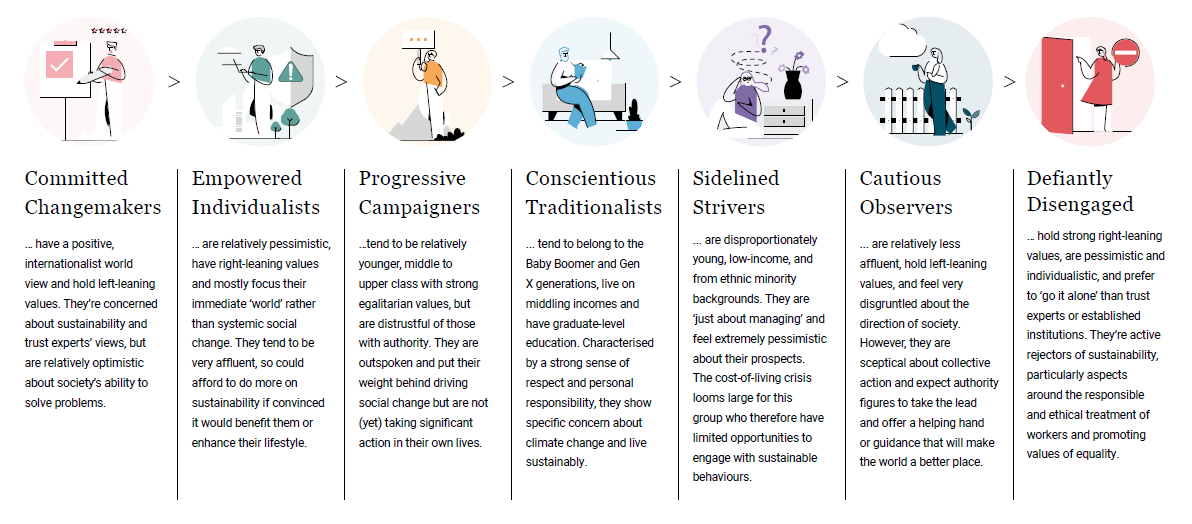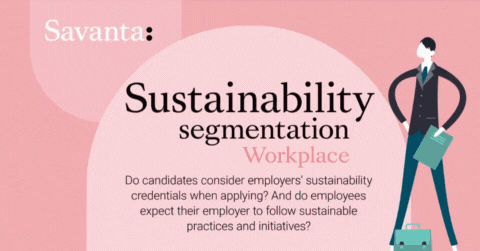
Over half of staff (55%) want to see responsible employment in their workplace.
Workers’ top two criteria for choosing an employer won’t shock you—a competitive salary (64%) and flexible working hours (56%). The third one though has ethical practices at heart— they want an employer with a reputation for treating their staff well (51%).
Our recent Sustainability Segmentation study revealed how intentions and actions towards sustainability vary across the workplace. We found that regardless of employees’ broader views of the sustainability agenda, most agree that companies who embrace sustainable practices will benefit in the long-run and over half of staff (55%) want to see responsible employment in their workplace.
Those who are highly motivated by a sustainable agenda were more likely to see the wider benefits, whilst all segments understand that sustainable practices will improve company perceptions, as well as staff attraction and retention.
About our Sustainability Segmentation
Our Sustainability Segmentation uncovers how society is embracing – or resisting – a desire to meet sustainable goals, even during a deep and global economic crisis, setting out to help marketers effectively communicate, and market, sustainability in a manner that directly connects with customer values.
Our findings identified that the public falls into seven segments based on their awareness, knowledge, ability to care and behaviours; from Committed Changemakers who have a positive, internationalist world view and hold left-leaning values to the Defiantly Disengaged, those holding strong right-leaning values, who are pessimistic and individualistic and prefer to ‘go it alone’ than trust experts or established institutions.
Download our free report here to read more about your audience segments.
How do the segments behave differently in the workplace?
Employers that offer responsible employment practices (including fair wages and fair working conditions), appeal to all segments. Among the strongest advocates are Conscientious Traditionalists (73%), the Defiantly Disengaged (72%) and Cautious Observers (63%), as well as Committed Changemakers (62%).
However, more specific initiatives appeal to the majority of Committed Changemakers and Empowered Individualists – suggesting they have higher expectations for employers. These include:
- Minimising the impact of products and services on the environment
- Securing sustainability credentials e.g. B Corp or LEED
- Community programmes and philanthropy
- Promoting sustainability issues in branding & marketing
- Working for or with other companies behaving sustainably
Download our infographic to view the different attitudes by segment.
Employees want their employers to lead the way with sustainable practices and initiatives
When it comes to leading sustainable practices and initiatives at work, 67% say it’s their employer’s role and 32% say it is employees’ responsibility. Cautious Observers (79%) and Progressive Campaigners (73%) are most in favour of employers leading the way. As stated previously, these segments share a left-leaning and likely pro-interventionism stance, which is potentially why they hold the same view.
On the other hand, the research suggests the issue is more nuanced. Only 54% of Committed Changemakers and 58% of Empowered Individualists agree – but also Sidelined Strivers, who overall have low intentions to live sustainably. So, at least four in ten out of these segments believe the onus is on employees instead.
All this suggests that while employers will have the final say on sustainable practices and initiatives, employees have a role to play too. Most expect their employer to set the agenda.
So what can employers do?
- Communication is key: communicating specific examples and most importantly, their impact to both employees, customers and stakeholders will see greater strategic benefits.
- Act as role models: leaders can ‘role model’ their company’s sustainability agenda, inspiring employees by demonstrating behaviours that drive the strategy forward.
- Drive inclusivity: provide opportunities for employees to take part in the sustainability agenda, giving them a sense of pride when goals are achieved.
Download our infographic to read more around what this means for your business or access the full report via the below form.
Notes:
The report is based on the findings of a survey of 12,016 adults aged 18+ in the United Kingdom (5,005), United States (5,006) and Canada (2,005). Data are weighted to be representative of age, gender, region and social grade (UK) or income/education (US and Canada).
Our segments include:

Download the full report:






